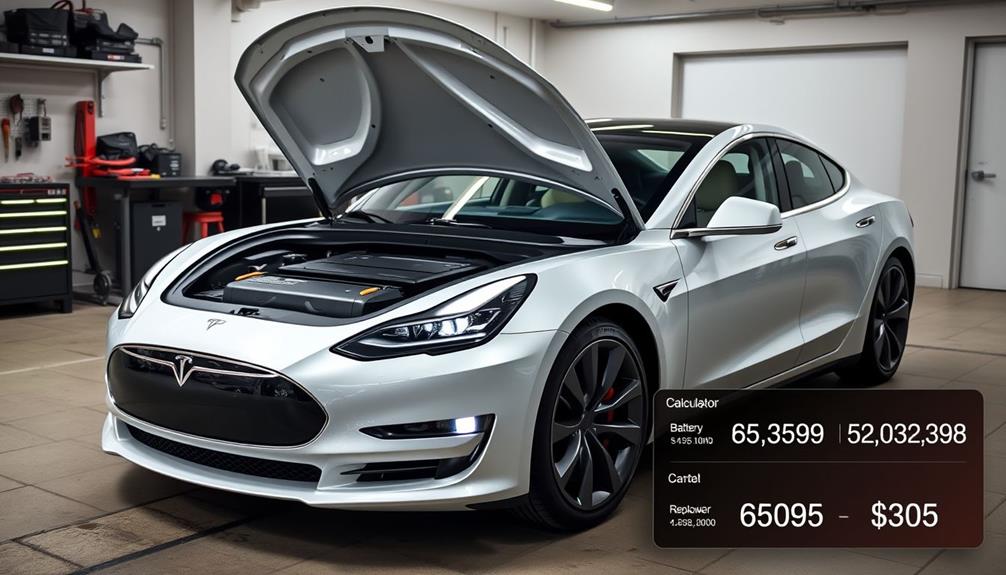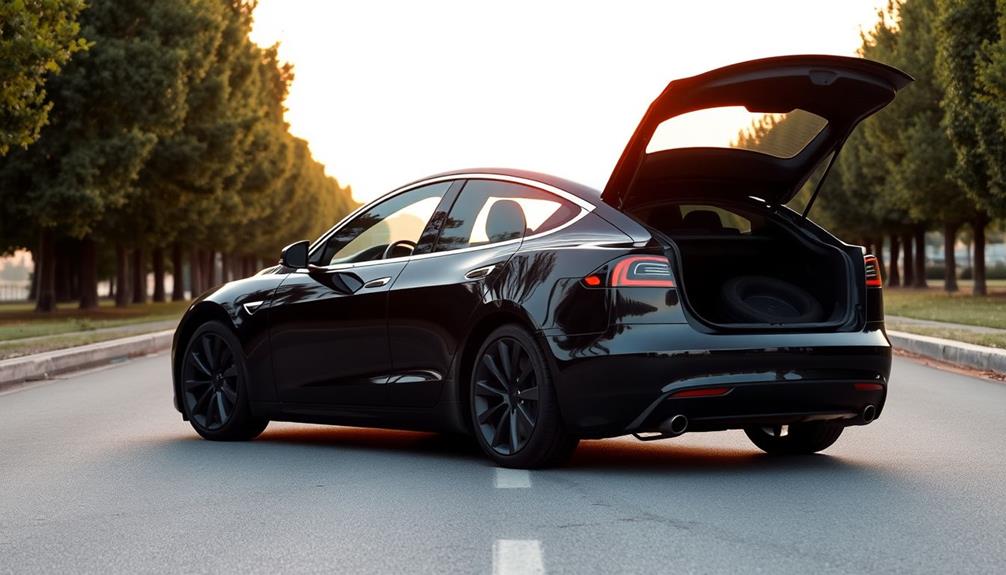Replacing a Tesla battery can range from $5,000 to $28,000, depending on your model and battery size. For instance, a Model 3 costs around $13,500, while Model S replacements can hit up to $22,000. Labor costs also vary, so keep that in mind when budgeting. Some warranties cover significant degradation, which can help reduce your costs. If you're looking to extend your battery life, regular maintenance and mindful charging habits play a key role. There's a lot more to take into account regarding replacement options and costs, so stick around to explore further.
Key Takeaways
- Tesla battery replacement costs vary by model; Model S ranges from $12,000 to $22,000, while Model Y is around $10,500 to $11,400.
- Model 3 battery replacement starts at $13,500, with total costs reaching up to $28,000 depending on battery size.
- Labor costs for replacements can add $500 to $3,000, depending on location and service provider.
- Warranty coverage allows for free replacements if battery capacity drops below 70% within 8 years or 100,000-150,000 miles.
- Regular maintenance and check-ups at Tesla service centers can enhance battery performance and longevity, potentially delaying replacement needs.
Battery Lifespan and Performance
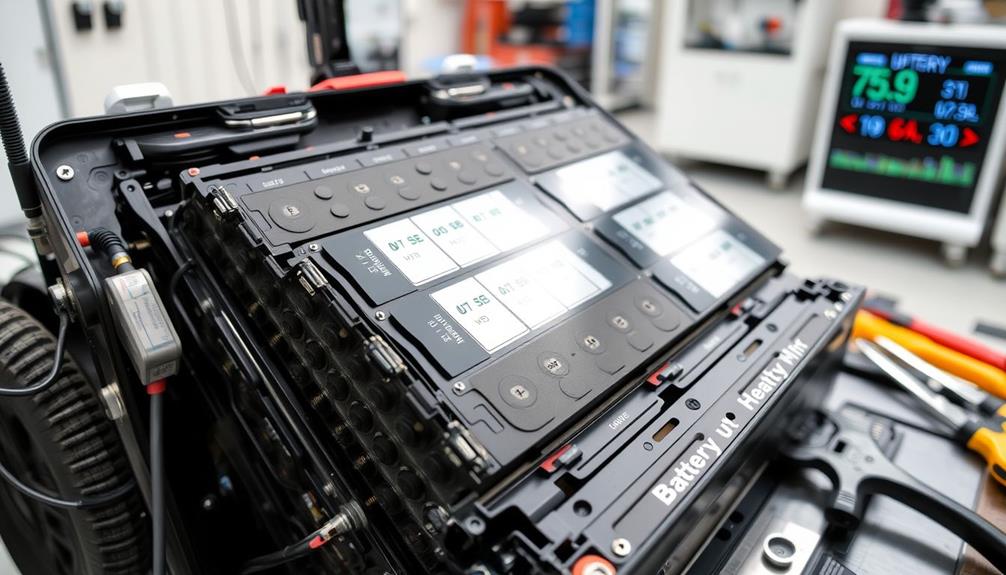
When you invest in a Tesla, understanding the battery lifespan and performance is vital, especially since these factors can greatly impact your driving experience.
Tesla batteries typically last between 10 to 20 years, with battery lifespan influenced by driving habits, maintenance practices, and supercharging frequency. You'll want to keep an eye on your battery health, as battery capacity retention must remain above 70% to qualify for warranty replacement.
Battery performance directly affects your vehicle's functionality; diminished capacity can lead to reduced range and acceleration. For example, the Model S can achieve a maximum range of 402 miles, while the Model Y offers 308 miles. This difference highlights how a higher kWh capacity correlates with increased range.
To guarantee peak battery performance, regular check-ups at a Tesla service center are vital. These visits help monitor battery health and performance, ultimately enhancing your driving experience.
Be aware that battery degradation is a natural process, but understanding how it works will help you make informed decisions about your Tesla battery replacement costs down the road.
Prioritizing battery care will keep your Tesla running smoothly for years to come.
Replacement Costs by Model

When it comes to replacing your Tesla's battery, costs can vary considerably by model.
For instance, you might find that the Model S and Model X have higher replacement expenses compared to the Model 3 and Model Y.
Understanding these model-specific costs and the factors that influence them can help you plan better for potential expenses.
Model-Specific Cost Breakdown
Tesla battery replacement costs can vary considerably depending on the model you own.
For the Model S, you're looking at a full battery replacement ranging from $12,000 to $15,500, with total costs—including labor—potentially reaching $20,000 to $22,000.
If you own a Model X, expect battery replacement to start at over $13,900, with labor costs that can add an extra $500 to $3,000 to the bill.
For those with a Model 3, the estimated cost for a remanufactured battery is around $13,500, but total expenses can range between $20,000 and $28,000 depending on specific circumstances.
Meanwhile, if you drive a Model Y, battery replacement costs are projected to be more affordable, ranging from $10,500 to $11,400, with labor charges around $500 for a typical three-hour job.
Factors Influencing Replacement Prices
Several factors influence battery replacement prices for Tesla vehicles, and understanding these can help you better anticipate costs. In general, the size and capacity of the battery pack, as well as the specific model of the Tesla vehicle, can impact the cost of a replacement. Additionally, factors such as the age of the vehicle, its usage, and any warranty or insurance coverage can also play a role in determining the overall tesla battery cost. It’s important for Tesla owners to consider these factors and potentially budget for a battery replacement in the future.
First, the model matters greatly. For instance, a Model S battery replacement can set you back between $12,000 to $15,500, with total costs reaching up to $22,000. In contrast, a Model Y battery replacement is generally more affordable, costing around $11,000 to $13,000.
Battery sizes also play an essential role in determining battery replacement costs. The Model 3 battery replacement starts at $13,500, but prices can climb to $28,000 depending on the specific battery size.
Additionally, labor costs contribute to the overall expense, as they can vary by location and service provider.
If your Tesla is still under warranty, you might be able to avoid some of these expensive parts, which can alleviate financial strain.
However, be aware of range loss and how it might affect your vehicle's performance, prompting earlier replacements.
Warranty Coverage and Policies
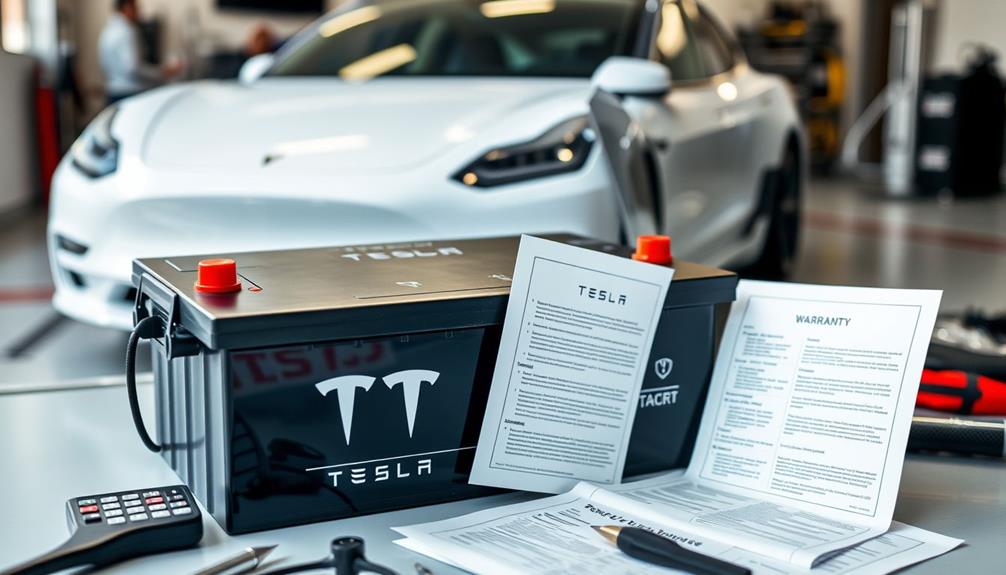
When it comes to Tesla's warranty coverage, you'll benefit from an 8-year or 100,000-150,000 mile guarantee, depending on your model.
If your battery degrades beyond 70% during that period, you could get a free replacement, but terms vary.
Plus, if you decide to sell your Tesla, the transferable warranty can add value for potential buyers.
Warranty Duration and Limits
Understanding the warranty coverage for Tesla batteries is important for any owner or potential buyer. Tesla offers a robust battery warranty that lasts 8 years, with mileage limits ranging from 100,000 to 150,000 miles, depending on the specific Tesla models.
This warranty covers significant capacity degradation, ensuring that if your battery's capacity drops over 30% during the warranty period, you're entitled to a replacement battery.
Warranty terms can vary by model. For example, pre-2020 Model S and Model X vehicles come with an unlimited mileage warranty, although certain battery packs may have exceptions. This provides a level of reassurance for owners, knowing they're protected against premature battery failures.
Additionally, the battery warranty is transferable to new owners upon resale, adding value to your vehicle and peace of mind regarding battery health.
However, it's essential to maintain your Tesla and adhere to service guidelines, as improper repairs or service can void the warranty.
Understanding these warranty limits and conditions is important for maximizing your investment and ensuring you get the most out of your Tesla experience.
Replacement Under Warranty Conditions
Tesla's warranty coverage offers peace of mind for battery replacement under specific conditions. With an impressive 8-year or 100,000 to 150,000-mile warranty, your vehicle's battery is protected against battery degradation that exceeds 30% or 70% capacity retention, depending on the model.
However, keep in mind that warranty terms can vary based on model year and mileage limits. If your Tesla hasn't been properly serviced, the warranty could be voided, so regular maintenance is essential.
You can enjoy free battery replacement if your battery fails to meet warranty criteria during the coverage period, ensuring you maintain your vehicle's battery health. This not only keeps you on the road but also helps extend the battery lifespan.
Another advantage is that warranties are transferable to new owners when you sell your vehicle, which can greatly enhance its resale value by assuring potential buyers of the battery's performance.
Staying on top of maintenance and understanding the warranty terms will help you maximize the benefits of your Tesla's battery warranty, providing you with both reliability and peace of mind.
Transferable Warranty Benefits
A transferable warranty can greatly enhance your vehicle's resale value and peace of mind regarding battery performance.
Tesla vehicles typically come with an impressive 8-year or 100,000-150,000 mile warranty, which covers battery degradation exceeding 30% during that period. This means if you sell your Tesla, the new owner can benefit from the same warranty terms, making your vehicle more attractive on the market.
The warranty can vary by model, with some older Model S and Model X vehicles offering unlimited mileage coverage for specific battery packs. This flexibility not only adds value but also alleviates concerns about potential replacement costs down the line.
To keep the warranty valid, it's essential to guarantee regular maintenance and proper service. If the vehicle isn't properly serviced, the warranty could be voided, leaving you exposed to unexpected costs.
Luckily, the warranty covers parts, labor, and repair expenses, including loaner vehicles and towing in some cases.
Options for Replacement Services
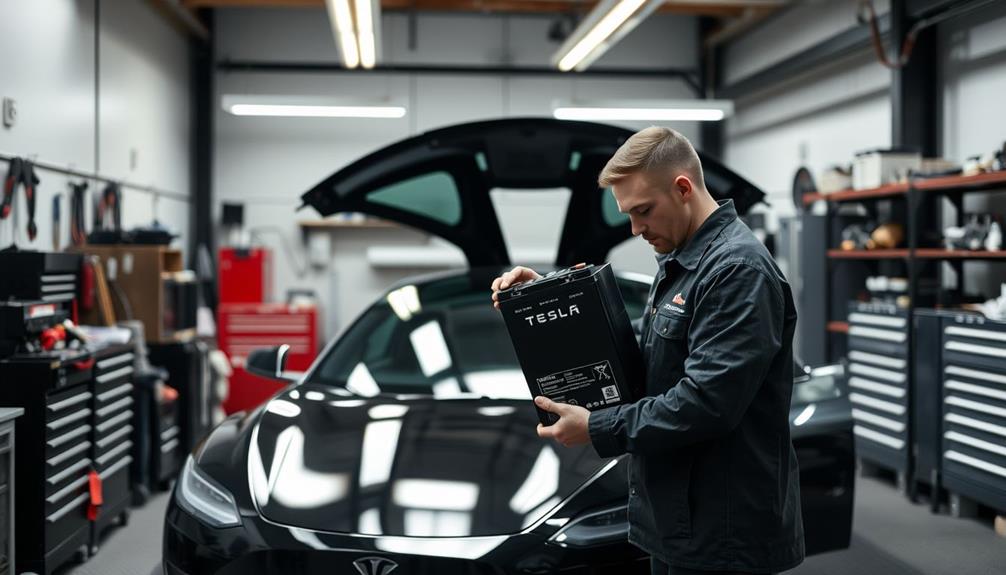
When considering battery replacement for your Tesla, you have several service options to choose from. Tesla service centers provide specialized expertise, ensuring that your battery replacement is handled correctly.
However, this convenience often comes with higher costs compared to third-party shops, which can save you money but may lack the specialized knowledge required for Tesla repairs.
If you're technically inclined, you might consider a DIY battery replacement. This option can be cost-effective, but it's essential to recognize that it requires significant skill and a solid understanding of your vehicle's systems.
Keep in mind that opting for DIY work or third-party shops can have warranty implications, possibly affecting your future coverage.
For those who prefer a hassle-free experience, scheduling your battery replacement through the Tesla app makes managing appointments simple and efficient.
Ultimately, your choice will depend on your budget, comfort level with technical tasks, and how much you value the expertise of Tesla service centers.
Whichever option you select, understanding the costs associated with each will help you make the best decision for your Tesla battery replacement.
Signs You Need a Replacement
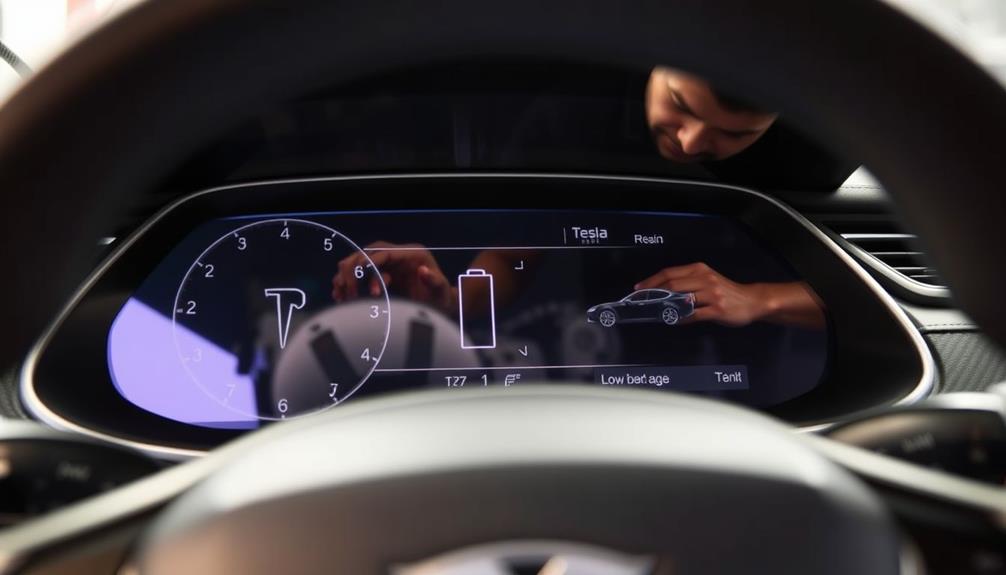
Noticing the signs that your electric vehicle needs a battery replacement can save you from unexpected issues down the road. As a Tesla owner, it's essential to keep an eye on your vehicle's performance.
Here are some key indicators that signal you need a replacement:
- A sudden drop in driving range exceeding 20%
- Battery capacity degrading beyond 30% of its original capacity
- Notifications from Tesla about battery issues or alerts in your vehicle's software
- Sluggishness during acceleration that's consistent over time
If you experience any of these signs, it's important to act quickly. A significant drop in your driving range can affect your daily commutes and overall driving experience.
If your battery struggles to hold a charge, it could indicate potential battery failure. Additionally, if you receive notifications from Tesla regarding battery issues, don't ignore them; they could be your first warning.
Tips to Extend Battery Life

To maximize your Tesla's battery life, several practical strategies can make a considerable difference.
First, consider storing your vehicle in a garage. This helps protect the battery from extreme temperature fluctuations, which can negatively affect its longevity and performance.
When it comes to charging, minimize the use of DC Fast Charging; instead, opt for regular Level 2 charging to help preserve battery capacity over time.
Avoid full battery discharges. A typical discharge rate is around 1% per day, so keeping your battery topped off can maintain its health.
Driving on flat routes instead of hilly terrains can also reduce battery strain, enhancing overall energy efficiency and extending battery life.
Lastly, be mindful of the cargo weight in your vehicle. Reducing excessive weight can considerably improve energy efficiency, as carrying heavy loads leads to increased energy consumption and faster battery degradation.
Concerns With Used Batteries
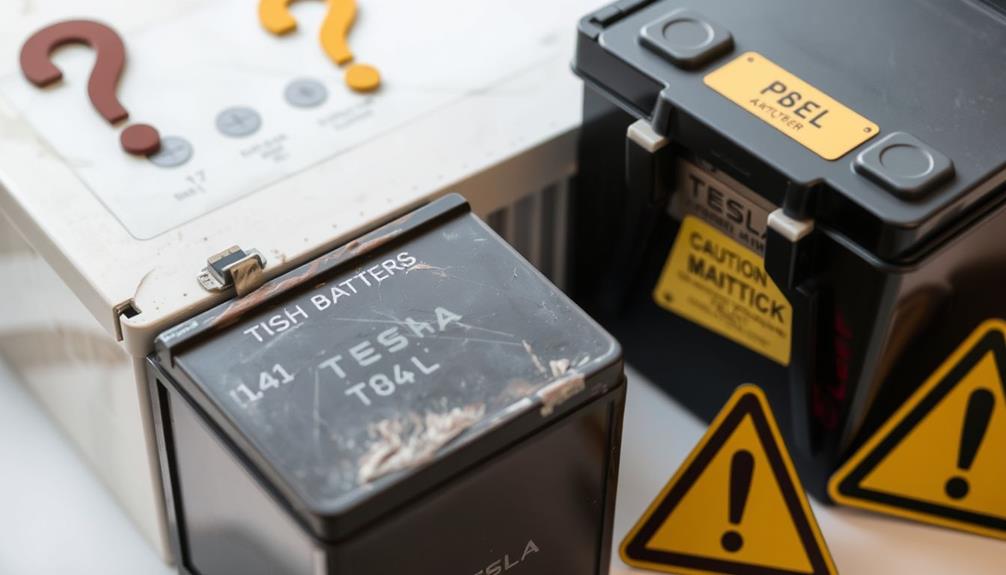
Buying a used Tesla can come with its share of concerns, especially regarding the battery's condition. The cost to replace a battery can soar up to $22,000, particularly for older models like the 2013 Model S. This can be a shocking reality for many buyers.
To help you navigate these concerns, consider the following:
- Repair history: Understanding what repairs have been done is vital.
- Charging habits: Past owners' charging patterns can impact battery health considerably.
- Inspection necessity: A pre-purchase inspection by a Tesla Service Center is highly recommended.
- Certification issues: Repairs from a non-Tesla service center may lack proper certification, jeopardizing battery performance.
Evaluating the condition of used Tesla batteries is as essential as checking the engine in a traditional car. You want assurance that you're not inheriting a costly problem.
Knowing the battery's health upfront can save you from unexpected expenses down the line. So, take the time to do your homework and verify that your potential investment won't turn into a financial burden.
Industry Trends and Insights

Understanding the costs and concerns associated with used Tesla batteries sets the stage for exploring broader industry trends. The cost of a Tesla battery replacement can range from $5,000 to $20,000, with the Model 3 averaging around $13,000. This significant investment is influenced by rising prices of essential minerals like nickel, cobalt, and lithium used in lithium-ion battery manufacturing.
As the EV market expands, competition among manufacturers is driving innovations in battery technology. These advancements aim to reduce costs and improve the longevity of new Tesla battery packs. Industry data reveals that Tesla batteries typically retain over 70% capacity after 8 years, minimizing the frequency of replacements. Regular maintenance and software updates can also enhance battery performance, prolonging vehicle life and reducing replacement needs.
| Aspect | Details |
|---|---|
| Average Replacement Cost | $5,000 – $20,000 |
| Model 3 Replacement Cost | ~ $13,000 |
| Lifespan Capacity | 70% after 8 years |
| Influencing Minerals | Nickel, Cobalt, Lithium |
These trends highlight the evolving landscape of battery technology and its impact on the cost of replacing a Tesla battery.
Frequently Asked Questions
How Much Is a Model Y Battery Replacement?
If you're considering a Model Y battery replacement, expect to pay between $11,000 and $13,000. Labor costs add around $500, but don't worry—failure rates for this model are minimal, keeping replacements rare.
How Many Years Do Tesla Batteries Last?
Tesla batteries typically last between 10 to 20 years, depending on how you use and maintain them. With proper care, you can expect them to retain over 70% capacity after eight years.
What Is the Price of Tesla Battery Car Battery?
Imagine your Tesla's battery is like a smartphone's lifeline. The price for a Tesla battery replacement can range from about $10,500 to over $15,000, depending on the model, age, and battery specifications.
Will Tesla Replace Your Battery for Free?
Yes, Tesla'll replace your battery for free if it degrades below 70% capacity during the warranty period, typically eight years or 100,000-150,000 miles. Just make sure you follow the service guidelines to keep it valid.
Conclusion
In the world of electric vehicles, battery replacement costs can feel like a financial black hole, but don't let that scare you! With the right knowledge and care, you can extend your battery's life and avoid those intimidating fees. Keep an eye out for warning signs, explore your replacement options, and remember: a little TLC goes a long way. So, embrace the ride and keep your Tesla's battery running like a well-oiled machine for years to come!
